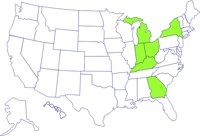Contact CDC
- 800-CDC-INFO
888-232-6348 (TTY)
cdcinfo@cdc.gov - Report a Foodborne Illness
Investigation of Multistate Outbreak of E. coli O157:H7 Infections
Updated July 16, 2008
State departments of health and agriculture in several states, collaborating local health jurisdictions, CDC, and the United States Department of Agriculture’s Food Safety and Inspection Service (USDA-FSIS) are investigating a multi-state outbreak of Escherichia coli O157:H7 infections. As of July 15, 2008, 45 confirmed cases have been linked both epidemiologically and by molecular fingerprinting to this outbreak. The number of cases in each state is as follows: Georgia (1), Indiana (1), Kentucky (1), Michigan (20), New York (1), and Ohio (21). Their illnesses began between May 27 and June 24, 2008. Twenty-three persons have been hospitalized. One patient developed a type of kidney failure called hemolytic-uremic syndrome (HUS). No deaths have been reported. Twenty-six (58%) patients are female. Patients range in age from 4 to 78 years with a median age of 19 years.
CDC and public health agencies across the United States are continuing surveillance activities to detect additional cases related to the outbreak. CDC and state laboratories are using advanced molecular testing techniques to help determine the extent of this outbreak.
State health and agriculture departments tested ground beef recovered from several patient residences that was purchased at Kroger® retail stores in Michigan and Ohio. Molecular fingerprinting testing conducted by the Ohio and Michigan Departments of Health and Agriculture Laboratories, in collaboration with PulseNet, the national molecular subtyping network for foodborne disease surveillance, on E. coli O157 isolates isolated from these ground beef samples have confirmed the isolates to be the outbreak strain of E. coli O157.
CDC's OutbreakNet Team conducted a multi-state case-control study in collaboration with health authorities in Ohio and Michigan to epidemiologically examine exposures that would be related to illness. The data indicate a significant association between illness and eating ground beef purchased at one of several Kroger® Company stores in Michigan and Ohio. CDC has provided these results to the USDA-FSIS and public health agencies in Michigan and Ohio.
On June 25, 2008, a recall was announced for ground beef sold at Kroger® Co. Stores in Michigan and Ohio. On July 3, the Kroger® Co. expanded the June 25th recall to include ground beef products from Kroger® establishments outside of Michigan and Ohio. On June 30, 2008, a recall of 531,707 pounds of ground beef components from Nebraska Beef Ltd. was announced. On July 3, 2008, Nebraska Beef Ltd. expanded the June 30 recall to include all beef manufacturing trimmings and other products intended for use in raw ground beef produced between May 16 and June 26, 2008, totaling approximately 5.3 million pounds. More information about these recalls can be found at the United States Department of Agriculture, Food Safety and Inspection Service’s (USDA/FSIS) web site at http://www.fsis.usda.gov/Fsis_Recalls/. FSIS has confirmed that none of the affected products remain available for purchase at stores; however consumers are urged to check their refrigerators and freezers and discard or return the ground beef products for a refund. Consumers with questions about the recall should contact the Kroger Consumer Hotline at (800) 632-6900 or James Timmerman, Nebraska Beef Ltd. Vice President of Administration at (402) 397-7300.
Consumers with food safety questions can "Ask Karen," the FSIS virtual representative available 24 hours a day at AskKaren.gov. The toll-free USDA Meat and Poultry Hotline 1-888-MPHotline (1-888-674-6854) is available in English and Spanish and can be reached from l0 a.m. to 4 p.m. (Eastern Time) Monday through Friday. Recorded food safety messages are available 24 hours a day. Because any raw ground beef can contain disease-causing germs, CDC and USDA-FSIS encourage consumers to use good food safety practices and to heed the following advice when preparing or consuming ground beef:
- Wash hands with warm, soapy water for at least 20 seconds before and after handling raw meat and poultry. Wash cutting boards, dishes and utensils with hot, soapy water. Immediately clean spills.
- Keep raw meat, fish and poultry away from other food that will not be cooked. Use separate cutting boards for raw meat, poultry and egg products and cooked foods.
- Consumers should only eat ground beef or ground beef patties that have been cooked to a safe internal temperature of 160°F.
- Color is NOT a reliable indicator that ground beef or ground beef patties have been cooked to a temperature high enough to kill harmful bacteria such as E. coli O157:H7.
- The only way to be sure ground beef is cooked to a high enough temperature to kill harmful bacteria is to use a thermometer to measure the internal temperature.
- Refrigerate raw meat and poultry within two hours after purchase or one hour if temperatures exceed 90°F. Refrigerate cooked meat and poultry within two hours after cooking.
- If a restaurant serves you an under-cooked hamburger, send it back for more cooking. Ask for a new bun and a clean plate, too.
- Never put cooked hamburgers or meat on the plate they were on before cooking. Wash the meat thermometer after use.
See E. coli O157:H7 for more information.
Previous Updates on this Outbreak
Page last modified: July 16, 2008
Content source: National Center for Zoonotic, Vector-Borne, and Enteric Diseases (ZVED)

